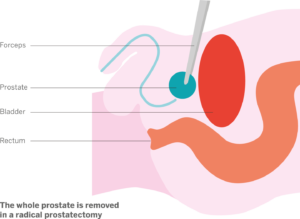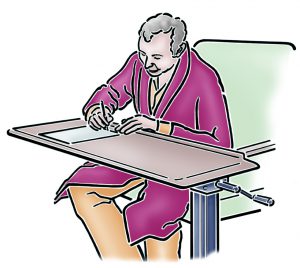A radical prostatectomy is a major operation in which the whole prostate is surgically removed. The aim is to remove all of the cancerous cells. Here we cover how the surgery is performed and what the potential side-effects are.
Radical Prostatectomy
What is involved and what are the risks?
How is a radical prostatectomy conducted?
Radical prostatectomy can be done by a variety of routes. Depending on where the tumour is, the surgeon may be able to save some of the nerves on either side of the prostate, which will affect the side-effects. Your consultant should be able to discuss this with you. Surgery can be open, in which case a surgeon will make either an abdominal (retropubic) cut or cut between the testicles and the back passage (perineal), or keyhole surgery (laparoscopic or robotassisted surgery). Keyhole surgery involves a number of smaller incisions. The availability of robot-assisted prostatectomy is increasing across the UK, and is now available in centres in England, Wales, Scotland and Northern Ireland, but may not be available in all hospitals.
Your PSA should fall to a very low level after the operation. As long as it does not rise, it is generally considered that you are free of the cancer. Further treatment with hormones, radiotherapy or chemotherapy may be needed if the PSA blood test still shows that cancer is present after surgery.

Who should choose to have a radical prostatectomy?
The surgeon (who can carry out a radical prostatectomy) and the clinical oncologist (who can offer you radical radiotherapy) will help you decide between active surveillance and radical prostatectomy and radical radiotherapy. Radical prostatectomy is generally only recommended for men with a life expectancy of at least 10 years. Your decision may be influenced by the side effects of each option and how they might affect your quality of life.
What are the side effects of a radical prostatectomy?
-
- Up to around one in five men suffer mild urinary incontinence. This means you may leak urine when you cough. Incontinence is often temporary.
- Up to seven in every 100 men suffer major problems with urinary incontinence. This causes continuous leakage of urine. Incontinence is often temporary.
- Almost all – but not all – men will have some difficulty getting erections (impotence), although many will recover to some extent.
- All men will be infertile and have a dry orgasm.
- Some men have problems passing urine owing to scarring at the new join between the urethra and the bladder.
There are treatments available for impotence and incontinence that your doctor can discuss with you. It is possible to store sperm before treatment for later use in IVF, if you think you may want to have children later. Incontinence is usually temporary, and you may find pelvic floor exercises reduce your risk and help you to recover
If you think your life expectancy is limited, you may feel the side effects of surgery on your quality of life may not be worth any possible gain. Even if your life expectancy is not limited, you may be more concerned about your quality of life. This is a decision only you can make.

What do I need to know about ‘consenting to treatment’?
The consent form is a formal agreement between you, the surgeon and the hospital. It says that you are willing to have the treatment shown on the form. It is important that you read the consent form carefully and ask hospital staff any questions you have about it before signing.
The surgeon operating on you, or one of their doctors, should bring the consent form to you to sign. You might also be asked to agree to provide spare prostate tissue for research or take part in a clinical trial. This will be your decision.
It is important that you are aware of the side effects of treatment before you sign a consent form.
What does the operation involve and are there any risks?
Radical prostatectomy is a major operation with potential risks and complications.
The time you will have to wait for your operation will vary depending on where you are, but current targets are within 62 days of the hospital receiving your referral. Bring any medication you are taking with you and show this to the nursing staff or doctor.
At the hospital
- You will be asked to go to the hospital before the operation for routine checks, including:
- Your blood pressure, pulse and temperature
- A urine test
- An ECG (tracing your heartbeats electrically)
- Blood tests
- A chest X-ray
Usually, you will be admitted either the day before or early on the day of your operation. Make sure that you do not eat or drink anything in the six hours before surgery, though you may be able to drink water until a few hours before your operation. Your medical team will explain this to you. On the day you go to hospital, you may have your blood pressure, pulse and temperature checked again. Most men are in hospital 2-4 days for laparoscopic and open surgery, or 1-2 days for robotic surgery but this can vary.
What happens before the operation?
The anaesthetist who will be looking after you during the operation will visit you and ask you questions about:
Previous operations and anaesthetics This is to make sure you have had no problems with anaesthetics in the past.
Medicines It is important that the anaesthetist knows about the medication you are taking.
Dental problems The anaesthetist will have to put a tube in your mouth to help you breathe during the operation. It is important for them to know about caps and crowns. False teeth will need to be removed before undergoing a general anaesthetic.
Chest problems and smoking If you smoke, you are more likely to suffer complications from surgery. You should give up smoking at least a week before you go into hospital. Smoking is forbidden in hospital.
Allergies You must tell the anaesthetist about any allergies you have.
Overweight You may be asked to lose weight before the operation.
The surgeon will also take precautions to prevent you developing a blood clot. You may be asked to wear elastic stockings and be given injections of blood thinning drugs.
What happens just after the operation?
After the operation you will be taken to the recovery ward. Here, a nurse will check your pulse and blood pressure regularly.
You will have to wait before you have a drink because the anaesthetic may make you feel sick. You will receive food and drink gradually. However, within 24 hours you should be able to eat and drink normally. If you feel sick or have some pain, tell the nurse, who can give you something to help. It will help you recover quicker if you are free of pain, so it is important to tell the nurse if you need painkillers.
What happens in the days after the operation?
You will have a bag of fluid above your bed called a drip (intravenous fluids), which runs through a needle into your arm. This will probably be removed within a few hours. You will have a catheter (plastic tube) passing through your penis into your bladder to drain urine. You may also have one or more plastic tubes in your belly that are attached to drainage bags by your bed – these either drain urine from your bladder or any fluid from the site of the operation. The drain tube is usually removed a day or two after surgery.
You may experience some pain in the first few days. But it is important to walk around after the operation to help prevent clots forming in your legs. If you need painkillers, ask for them.
Your catheter will stay in for about one to three weeks, so you will take it home attached to your leg. (Do not worry, though: it is easy to hide this.) It is important to keep the catheter clean to help prevent infection. A daily bath or shower will help, but if you notice any discharge or pain around the tip of your penis, tell your nurse or doctor. You should try to drink two litres of fluid each day. After the operation, there may be blood in your urine. This is fairly normal.
Occasionally a blood clot forms and blocks the catheter, preventing the urine from coming out. This can be painful and you should tell a nurse or doctor so they can remove it for you.

What happens when I go home?
Although you should take it easy for a month, it is important to take some gentle exercise such as walking, as you will still be at risk of developing clots in your legs. Standard OTC painkillers should be enough to deal with any pain but you should seek advice from your doctor/pharmacist.
You will be given a drainage bag for your catheter that you can strap to your leg. You will be shown how to do pelvic floor exercises to improve continence. One to three weeks after you go home, you will have to return to the hospital to have the catheter removed. This is not usually painful although it can be a bit uncomfortable.
If you had clips rather than dissolvable stitches, you will have these removed by the nurse at your GP’s surgery. This is not usually painful. You can return to work after a month although you will probably still feel more tired than usual.